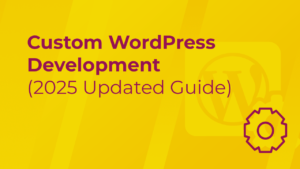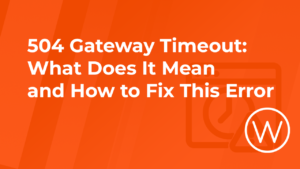If your WordPress site has started to feel sluggish or if you’re seeing slow load times that are hurting your traffic or SEO, a caching plugin can help bridge that performance gap. Most good caching plugins create static versions of your pages so they can be served quickly, reducing the need for WordPress to generate each page dynamically every time someone visits.
To help you find the right caching plugin, here are some great options we’d recommend, free and paid, included.
7 Best WordPress Caching Plugins (Free Included)
If you’re considering a caching plugin for your WordPress site, one of the first things to think about is your level of technical comfort. After considering a wide range of options, these are the seven we found most effective, reliable, and accessible, with great free versions included:
- WP Super Cache
- WP Rocket
- Cache Enabler
- W3 Total Cache
- LiteSpeed Cache
- Hummingbird
- WP Fastest Cache
WP Super Cache
Besides being free and relatively easy to set up, WP Super Cache has all the features you want to look for in a quality WordPress caching plugin. This one gives you multiple ways to speed up your site, including a simple caching mode (which can feel risky if you’re not confident with code).
WP Super Cache can deliver lightweight, prebuilt pages to almost every visitor, so your server stays responsive even during traffic surges. Тhere’s an Expert Mode if you want the absolute fastest performance using mod_rewrite, but we stuck with Simple Mode, which was nearly as fast and much safer to configure.
There are also thoughtful extras, like preload mode (to keep your entire site cached and fresh), support for CDNs, and the ability to compress pages for better load times. It even has a WP-Cache mode that works well for logged-in users or visitors who leave comments, which isn’t something every free plugin supports.
(Source: WP Super Cache)
W3 Total Cache
Once you take the time to configure W3 Total Cache properly, you will notice a real difference in page load speed and responsiveness, especially on mobile. Features like minifying CSS and JavaScript, enabling browser caching, and integrating a CDN work to noticeably improve your Core Web Vitals scores.
W3 Total Cache may not always feel intuitive at first, but once you get familiar, you will appreciate how detailed it is. You can use our pre-configured settings by following our guide here to get maximum results with the plugin.
Where W3 Total Cache stands out for us is during traffic spikes. The site can hold up well without slowing down, and features like object caching and lazy loading help reduce server strain. For anyone willing to spend a little time tweaking things, the payoff in performance is well worth it.
W3 Total Cache offers a free version, and you may not use all the Pro features, like fragment caching or REST API caching, but it’s nice to know they’re available if you need them. Overall, this is one of the most powerful and flexible caching tools on WordPress.
(Source: W3 Total Cache)
LiteSpeed Cache
LiteSpeed Cache is a smart pick for anyone using a LiteSpeed-powered web host, especially those running high-traffic WordPress sites or WooCommerce stores.
(If your host doesn’t support LiteSpeed or OpenLiteSpeed, you can still use many of the plugin’s optimization features, but you won’t get the full server-level caching benefits. In that case, something like WP Super Cache or W3 Total Cache might be a better fit.)
For LiteSpeed users, though, this plugin is really great. The caching is handled at the server level, which means it’s faster and more efficient than plugins that rely solely on PHP. LiteSpeed Cache is also packed with features like image optimization (with AVIF and WebP support), database cleanup, lazy loading, and critical CSS generation.
The plugin also works well with most major tools, like WooCommerce, Yoast SEO, and bbPress. It supports private cache for logged-in users, separate mobile/desktop caching, and lets you fine-tune purge rules based on events – something that helps keep dynamic content accurate without any extra effort.
LiteSpeed Cache is free, flexible, and incredibly powerful.
(Source: LiteSpeed Cache)
WP Rocket
You’ll want to invest in WP Rocket if you’re looking for an all-in-one caching plugin that instantly improves your site speed.
With WP Rocket, your site becomes noticeably faster and better optimized for Google’s Core Web Vitals, without you needing to juggle multiple plugins or settings. The plugin includes everything from lazy loading and minification to JavaScript delay and unused CSS removal.
WP Rocket works great for personal blogs, agency-built sites, or WooCommerce stores. It’s also compatible with nearly every major theme and plugin.
It’s not free. If you want to set it up on your site, WP Rocket is a premium WordPress caching plugin. Plans start at $59/year for one site, with multi-site options available and a 14-day money-back guarantee if you want to try it first.
(Source: WP Rocket)
Hummingbird
The Hummingbird caching plugin not only offers full-page and browser caching but also goes further with asset optimization features like minifying CSS/JS, deferring scripts, and compressing files with GZIP. You can scan your site and apply most fixes in one click, which makes it feel much more guided than basic caching plugins.
Hummingbird adds font optimization, Cloudflare integration, and lazy loading through Smush. If you want advanced tools like Critical CSS generation and delayed JavaScript loading, you’ll need to upgrade to Hummingbird Pro, which comes with a WPMU DEV membership.
(Source: Hummingbird)
WP Fastest Cache
Why did we find WP Fastest Cache one of the most well-rounded caching plugins for WordPress? It’s not just the speed. While it doesn’t require any deep technical knowledge to get started, it’s packed with performance tools that go well beyond basic page caching.
What makes this plugin stand out, though, is how much you can do with it. There’s built-in support for minifying HTML and CSS, enabling GZIP compression, combining files, and setting cache expiration rules – features that many free plugins leave out or reserve for premium tiers.
We also liked being able to exclude certain pages, block cache for specific content using shortcodes, and disable caching for mobile users or logged-in visitors.
The plugin’s design is clear and organized, with everything laid out in a way that didn’t leave us guessing. We especially appreciate how it works seamlessly with CDNs like Cloudflare and BunnyCDN, automatically syncing cache purges across services. With so many features packed in, even more if you upgrade to premium, it can take a bit of time to explore what everything does.
The premium version unlocks extras like lazy loading, image optimization, WebP conversion, and even Google Fonts async loading, but the free version is fast and capable enough for most use cases.
(Source: WP Fastest Cache)
Cache Enabler
Cache Enabler feels very lightweight and straightforward to use, without compromising performance. It doesn’t come loaded with features you don’t need, which makes it ideal for smaller sites. It still covers the essentials, though: it creates static HTML files and serves them directly from the server’s disk.
It includes features like automatic and manual cache clearing, support for Brotli and GZIP compression, and even WebP image delivery when used with an image optimization plugin like Optimus.
The design is very stripped down. For users who want more built-in integrations or detailed customization, it might feel a bit too simple. Cache Enabler is completely free.
(Source: Cache Enabler)
How We Picked the Best WordPress Caching Plugins
We analyzed a group of popular WordPress caching plugins, including both free and freemium options. While many caching plugins claim to be beginner-friendly, their ease of use, reliability, and actual performance vary significantly, and can be better understood by using speed testing tools.
Consider Your Site Type and Technical Skills
We looked for plugins that made setup simple for users with little technical background but still offered advanced options. In the research, we paid attention to how clearly the settings were labeled, how much documentation was available, and how much configuration was needed to get noticeable results.
For example, brochure-style sites with static content can thrive with lightweight plugins like Cache Enabler, whereas busy eCommerce stores may benefit from more powerful solutions like LiteSpeed Cache and W3 Total Cache. We considered how adaptable each plugin was across different site types and hosting environments.
What We Measured:
Ease of setup: We looked at how quickly each plugin could be installed and activated. We also considered how beginner-friendly the UI was and whether any technical knowledge was required to get started with caching.
Caching flexibility: We evaluated the caching methods each plugin supported (static HTML, object caching, database caching, and browser caching). Besides, we noted whether it offered advanced features like mobile-specific caching, support for logged-in users, or separate cache versions for different device types.
Compatibility: We considered how well the caching plugin worked alongside common WordPress tools, such as WooCommerce.
Extra features and usability: We explored additional features such as GZIP or Brotli compression, cache preloading, WebP image support, and CDN integration.
Conclusion
All the WordPress caching plugins we included in this guide offered noticeable performance improvements and were manageable to set up. Some, like W3 Total Cache, took a bit more time to configure, but that’s mainly because the more advanced plugins offer a wider range of optimization options.
Before installing any plugin, take the time to research its safety and reputation, and ensure you’re using the most recent version. Plugins are frequent targets for cyberattacks, and using outdated ones can leave your site vulnerable. For a real-world case, read our article on Real-Time Defence Against a WordPress Plugin Exploit to see how we identified and stopped a serious threat in real time.
Frequently Asked Questions

You know speed and performance matter for your WordPress site, so you can assess whether a caching plugin is right for you. Do you want your site to load faster or improve SEO with better page speed scores? If so, adding a caching plugin is one of the easiest ways to get those benefits without touching your theme or switching hosts.
Besides being free and relatively easy to set up, WP Super Cache has all the features you want to look for in a quality WordPress caching plugin.
LiteSpeed Cache is free, flexible, and incredibly powerful.
W3 Total Cache offers a free version. It’s suitable for most users, though a premium version is available with advanced options.
WP Rocket is known for its user-friendly interface and built-in features. LiteSpeed Cache, on the other hand, offers deeper server-level optimization and full WooCommerce support, especially when used with LiteSpeed web server hosting.






